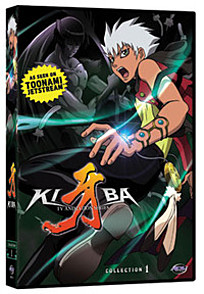Review
by Carl Kimlinger,Kiba
DVD - Collection 1
| Synopsis: |  |
||
In an oppressive alternate world, Zed, a snappily dressed youth with a burning thirst for freedom, dreams of escaping his dreary reality. During a disastrous escape from police custody, he gets his chance when a mysterious winged man-thing lures him into a dimensional portal. He materializes in the pastoral paradise of Templar, where he immediately learns that he is, by the inexorable logic of shonen action, the owner of a rare and immensely powerful “spirit”—a magical being that can be used to battle evil. And yes, evil is afoot. The nefarious rulers of the dark kingdom of Zymot are plotting to annex Templar into their pollution-fouled totalitarian meritocracy, and pretty much all that stands in their way is Zed and his spirit, Amir Gaul. As Zed makes friends with local girl Roya and her milquetoast best friend Mickey, Zed's best friend Noah is likewise transported to the intolerant theocracy of Neotopia. After accidentally killing every person he meets, Noah allows himself to be convinced that he is destined to uphold the “Absolute Law” of Neotopia, a course of action that puts him on a crash-course with the decidedly less rule-bound Zed. |
|||
| Review: | |||
That Kiba's respect for originality is smaller than a politician's conscience isn't the reason these twenty six episodes are such a slog. The show does, after all, belong to the shonen action genre, where a lack of originality is almost a badge of honor. Execution aside, Kiba's plot is no worse than that of its more successful peers. Heavily focused on politics and world-building, each of its nations has a distinctive character that dictates both the behavior of its constituents and its relations with other nations. The series doesn't shy away from tragedy or death, and allows its protagonists to taste both victory and humiliating defeat. There are character reversals that pit former allies against each other, and even some genuinely unexpected plot twists. Sure its characters are stereotypes so old that their mold has grown mold, and everything else, from the structure of its fights to the relationships of its protagonists, has been done to death a thousand times over. But the same could be said for Naruto or any other shonen series. What those other series know that Kiba apparently doesn't is that, in a market where plots are compilations of polished genre tropes, it isn't the substance that matters, but the execution. And Kiba flubs the execution at every turn. Events unfold with an inflexible, measured solemnity that renders the frequent tragedies curiously unaffecting, an effect exacerbated by director Hiroshi Koujina's inability to get inside his characters—characters already rendered largely ineffective by boring designs and boring personalities. Dull villains, dull heroes and uncharacteristically dull animation (from Madhouse) dull the fights. The various nations, though illustrated in high detail, are dully unimaginative, and for all their distinctiveness, the national character of each is dully reductive. And compounding every fun-crushing mistake the series makes is the soggy blanket of omnipresent drear that passes for a score, and a non-existent sense of humor. Instead of swift and razor-honed, Kiba ends up plodding and lifeless, a lesson in shonen action done wrong. As easy as it is to see the series' creators as an army of animation-industry zombies, the occasional spark of life does persist. It was no brain-munching monster who choreographed Roya's gymnastic fighting style, and likewise no rotting corpse who wrote her periodically affecting back-story. But for every grain of enjoyment one derives, there's a crushing boulder of pain waiting, big enough to make viewers wish that they, rather than the animators, were undead. Zed's badass posturing is unbearable, Roya's constant need to be rescued is deflating, and magical bigwig Zico's patronizing Santa-laugh could hospitalize less tolerant viewers. And when the show runs out of anime-inspired irritations, it—bless its adventurous soul—begins to mine foreign irritations: the beast men of Tusk are imperialistic stereotypes straight from the darkest depths of serials like Tarzan and Conan. Anyone who watched Kiba on Toonami Jetstream and wondered whether the dialogue really was that bad, or if it was ADV mucking with a wonderful Japanese script, can put their speculations to rest. ADV goes about dubbing the original's clichés with every ounce of their considerable professionalism. The rewrite is exacting in its accuracy, and the cast careful in their emulation of the original performances. The minor changes that are made are generally improvements (aside from the pronunciation of “Amir Gaul” as “a mere Gaul,” which has the unintended side-effect of making the characters sound like Francophobes). Leraldo Anzaldua's Zed, though not as expertly acted as his Japanese counterpart, is softer and more likeable; the overall performances are more lively; and occasionally—particularly during the beast-men sequences—the English version is good, campy fun. It's often tempting to dismiss all shonen series as mere accumulations of popular plot elements. It takes an actual accumulation like Kiba to remind us that a collection of shonen action elements does not a working shonen action vehicle make. By lazily assembling its potentially interesting elements, Kiba inadvertently highlights the often unappreciated level of skill required to make a pile of clichés exciting. Instead of a rollercoaster of tried-and-true thrills, Kiba is a warehouse full of rollercoaster parts—plenty of potential fun, but without the investment of energy to make it work. |
| Grade: | |||
|
Overall (dub) : C-
Overall (sub) : C-
Story : B-
Animation : C+
Art : C
Music : D
+ Roya is fairly sympathetic; occasionally rises from the doldrums long enough to impress visually. |
|||
| discuss this in the forum (15 posts) | | |||
| Production Info: | ||
|
Full encyclopedia details about Release information about |
||